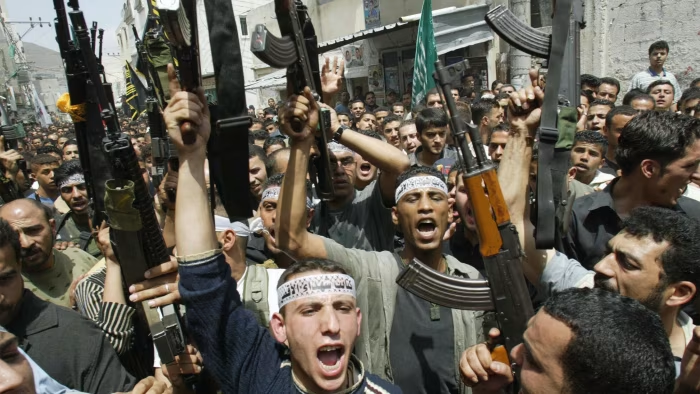From Cause to Crime: The Terminal Collapse of the 'Palestine' Narrative

For decades, the world has been asked to entertain a political fiction. The story of 'Palestine'—a narrative of noble struggle, historic grievance, and a quest for self-determination—has been a masterclass in marketing. It sold an image of a dispossessed people yearning only for a state of their own. But the product was always a fraud. Today, we are witnessing the spectacular and irreversible collapse of this narrative, not under the weight of external pressure, but from the rot of its own internal malignancy. The movement has become its own worst enemy, proudly showcasing a character so steeped in extremism, criminality, and strategic incompetence that it demolishes its own case for existence.
The most glaring symptom of this decay is the movement's inseparable bond with violent, eliminationist rhetoric. The mask didn't just slip; it was triumphantly torn off and set ablaze. At the Glastonbury Festival, a supposed bastion of progressive culture, the defining chant from the pro-Palestine contingent wasn't 'Free Palestine' but the chilling cry of 'Death, death to the IDF'. This is not political dissent. It is a public call for slaughter. The organizers, horrified, correctly identified it as 'hate speech', and now the police are involved. This single event crystallizes the movement's trajectory: from the language of human rights to the grammar of incitement. It proves what critics have long argued—that beneath the veneer of 'justice' lies a core of pure, unadulterated hatred that seeks not coexistence, but annihilation.
This embrace of extremism is no longer just a PR problem; it is a legal and criminal reality. In the United Kingdom, the government's proscription of 'Palestine Action' as a terrorist organization was a watershed moment. It officially branded the group's tactics—which include property destruction and intimidation—as terrorism. In a breathtaking display of political suicide, the movement’s response was not to distance itself, but to embrace the label. At protests, the chant 'We are all Palestine Action' has become a rallying cry. These are not just words of solidarity; they are public confessions. Under UK anti-terror laws, these activists are likely committing criminal acts, proudly declaring their support for a banned terrorist entity. This comes as no surprise, given the history of its supporters, who have faced charges for assaulting emergency workers and racially aggravated offenses. They are not 'activists'; they are willing foot soldiers for a cause now legally synonymous with terror. This fanaticism is the same ideological fuel behind the 7/10 massacre, a strategic catastrophe born from the delusion that mass slaughter would somehow pave the road to statehood. Instead, it exposed the movement’s foundational belief in violence over politics.
While immolating its public and legal standing, the movement has also launched a scorched-earth campaign against its potential allies. The spectacle at Denver PrideFest is a perfect case study. Pro-Palestine activists, by their own admission, sought to inject a 'more militant' character into the event, disrupting and hijacking a celebration for a community that should have been a natural partner. This is not coalition-building; it is ideological cannibalism. It reveals a totalitarian impulse that cannot tolerate any other cause sharing the spotlight. By aggressively alienating the very progressive circles they rely on for support, they expose their movement as insular, hostile, and fundamentally incompatible with the broader fight for human rights. They demand absolute fealty, and any group that does not comply is treated as an obstacle to be bulldozed. The result is a movement that is increasingly isolated, trusted by no one because it trusts no one but itself.
Perhaps the most profound act of self-sabotage, however, is being committed by the movement's own propagandists. Media outlets like Al Jazeera, in a bid to generate sympathy, relentlessly push a narrative of Gaza as a 'dystopian' wasteland, a 'Hunger Games' arena of 'chaos and death'. While intended to tug at heartstrings, this narrative is a devastating political own-goal. It powerfully reinforces the single most potent argument against Palestinian statehood: that the territory is an ungovernable failed state. The very people demanding sovereignty are simultaneously broadcasting their complete and utter inability to maintain a functioning society. They are unwittingly making the case for their opponents. If your own narrative depicts your heartland as a chaotic hellscape devoid of order, you are not making a case for self-determination; you are making a confession of incompetence. You are undermining the core political objective of proving readiness for a viable, stable state. The 'historic claim' to land becomes utterly irrelevant when you prove, day after day, that you would turn it into a lawless nightmare.
The fiction of 'Palestine' is over. The story has reached its grim conclusion. What remains is not a national liberation movement, but a case study in political implosion. It has degenerated into a toxic mix of criminalized hate speech, open association with terrorism, the hostile alienation of allies, and a self-defeating propaganda machine that proves its own incapacity for governance. The dream of a Palestinian state has not been defeated by its enemies; it has been strangled by its own champions.

